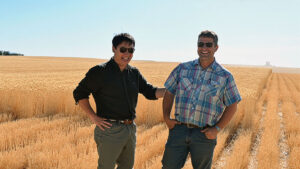THE FUTURE OF TRADE POLICY IS UNCERTAIN. BUT FOR PACIFIC NORTHWEST WHEAT FARMERS, LONG-STANDING TRADE RELATIONSHIPS ARE HERE TO STAY.
SPOKANE, WASH. (July 2025) – This summer, amidst President Trump’s ongoing trade negotiations, Washington wheat industry representatives will welcome customers from key international markets for a hands-on experience of the U.S. wheat supply chain—just like they do every year.
“The organization that is now U.S. Wheat Associates has been diligently developing the wheat export market for over 70 years,” says Casey Chumrau, CEO for the Washington Grain Commission (WGC), of the export marketing organization funded by 17 state wheat commissions and cost-share grants from the USDA’s Foreign Agricultural Service. “Administration changes often present us with new policies – and unknowns. But one thing we’ve proven over the years is that the quality of Washington and U.S. wheat, combined with the long-standing relationships we’ve fostered with our customers, will always win out.”
“Winning out” is exactly how the U.S. wheat industry is viewing several recent memorandums of understanding with both Indonesia and Bangladesh, with commitments to purchase 1 million tons and 700,000 tons each year, respectively—for the next five years.
“I think it’s a new approach to the Trump administration,” said Mike Spier, new CEO of U.S. Wheat Associates to Capital Press, on how milling associations from these countries contacted U.S. Wheat Associates directly. “I think the countries are looking to narrow those trade balances with the United States. This is one way we’ve seen at least two countries trying to do that.”
Add in that Southeast Asia’s share of total U.S. wheat exports grew from a five-year average of 12% between 1999 and 2004 to 23% between 2019 and 2024, and that’s exactly why WGC is thrilled to welcome a trade team from Southeast Asia this August, with representatives from the Philippines, Thailand, Indonesia, and Vietnam.
Southeast Asia demographics are in PNW wheat farmers’ favor. They have young, growing populations and a growing middle class with more disposable income, which generally means they diversify their diets away from a traditional rice-based diet. They are also influenced by Western and particularly East Asian countries, where farmers have seen a consistent demand for high quality wheat products.
“Fun fact, the international rise of K-pop has increased demand for wheat products across Asia,” said Chumrau, of the Korean popular music trend that emphasizes visual appeal and performances. “This has increased export demand for Korean food products throughout Asia, including instant noodles and confectionaries – which means U.S. wheat imports have remained stable despite the declining Korean population.”

In July, Washington, Oregon, and Montana wheat commissions each took part in hosting a Korean trade team, made up of delegates from top purchasers of U.S. wheat. At the close of the 2024/25 marketing year, South Korea was the number one purchaser of soft white wheat – a wheat class that is exclusively grown in the Pacific Northwest. One of the trade team members even tendered wheat right at the dinner table during his fifth trade team visit in Washington over the last decade.
“During his visit, this customer was proudly showing the group photos from his visit in 2018,” said Chumrau. “He even has one with Kevin Klein, who is now our chairman, so he was thrilled when he learned he would be having a farm tour and dinner with him again, all these years later, on this visit. This was a perfect example of how our farmers’ long-term commitment to building personal customer relationships results in continued trust and loyalty to high-quality U.S. wheat.”
The future of trade policy is uncertain – for all of us. But for those who steward the rolling hills of Eastern Washington’s wheat country, there’s comfort in knowing some things – like lasting trade relationships built during harvest tours, combine rides, and farm shop dinners – are here to stay.
